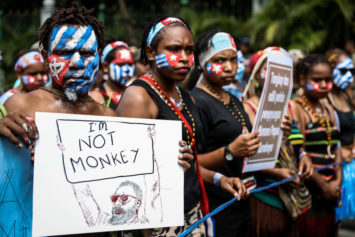In the last decade, Asian migrants have fanned out through southern Africa, opening shops in small towns and rural backwaters. While consumers in countries facing increasing economic hardships have come to depend on their low prices, local shop owners complain they are being forced out of business, pressuring governments to introduce restrictions on foreign traders.
In Malawi, Chinese-owned shops and restaurants have proliferated since the country established diplomatic ties with China in 2007. But the government was recently prompted by bitter complaints from local business owners to introduce legislation preventing foreign traders from operating outside of major cities.
The new law has mainly targeted Chinese traders, many of whom are now being forced to shutter their businesses in rural areas and to apply to the Ministry of Industry and Trade for business licenses to operate in Lilongwe, Blantyre, Mzuzu or Zomba – the country’s four major cities.
“They can operate in rural areas when they are in production and big business, not doing petty trading,” Malawi Minister of Industry and Trade John Bande told IRIN, adding that the government would continue passing legislation that encouraged serious foreign investment “to the benefit of Malawians”.
But human rights groups have described the legislation as xenophobic, and consumers like Arnold Mwenefumbo, from Karonga District in northern Malawi, complain that forcing out the Chinese traders will mean paying much higher prices for products sold by Malawians and other African nations.
“[The Chinese] were also employing our son and daughters,” said Mwenefumbo.
Lesotho
In Lesotho, a tiny land-locked country facing high rates of poverty and unemployment, the relatively recent appearance of thousands of foreign, mostly Chinese-owned, businesses has generated similar resentment from local business owners, but little government intervention.
Before the mid-1990s, Makhabane Theko ran a successful retail business in the capital, Maseru, but now leases his building to the same Chinese traders who he says pushed him out of business. “It’s difficult to compete against the foreign investors, especially the Chinese. You sell 500g of sugar for 8.00 maloti (US$1.4) and they will sell it for a price that is almost half that,” he told IRIN.
Stories like Theko’s are common. Although the exact number of Chinese in Lesotho is unknown, estimates range between 10,000 and 20,000, or up to 1 percent of Lesotho’s population of 1.9 million, according to a recent report released by the Brenthurst Foundation. “Business is good here,” said one Chinese trader.
Unlike neighbouring South Africa, which has a long history of Chinese migration and Chinese-run businesses, Lesotho has traditionally been a country of out-migration and has little experience with immigrants. National legislation limits ownership of small businesses to Basotho citizens, but the government has largely turned a blind eye to corrupt practices allowing Chinese migrants to purchase trading licenses or even national identity documents.
“Chinese are now selling makoenya [fat cakes], loose cigarettes, even beer at retail prices, but their business category forbids them from doing so,” said a street vendor who sells cigarettes in Maseru.
Yoon Jung Park, coordinator of the Chinese in Africa/Africans in China (CA/AC) International Research Working Group, has conducted research on perceptions of Chinese in southern Africa. She noted that small countries with struggling economies like Lesotho are seeing funding from Western donors dwindling; many may view Chinese investment as their next best hope. This is reflected in the lack of government action to regulate the proliferation of small Chinese-run businesses.
“I think there’s a link between official ties [with China] and the messages that get filtered down to people, especially in these small countries that are desperate for foreign aid, that the Chinese are the great hope and we need to be nice to them,” she told IRIN.
Read the rest of this story on Allafrica.com


